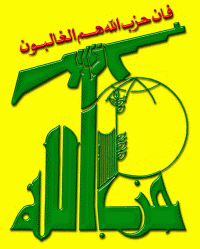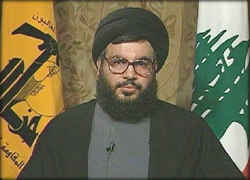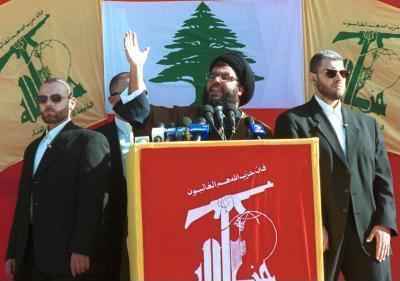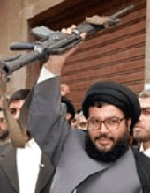|
Hezbollahaka hezbollah, hizbollah, hizbullah, huzbollah, hizbalah, "party of god" Throughout the 1980s, the nation of Lebanon had a number of deeply complex and storied problems worthy of a 400,000-word explanatory thesis, condensable to four words: There was no government.
Throughout the 1980s, the nation of Lebanon had a number of deeply complex and storied problems worthy of a 400,000-word explanatory thesis, condensable to four words: There was no government. Lebanon had hosted thousands of Palestinian refugees in the 1970s. At the end of the decade, Israel invaded Lebanon to get at Palestinian terrorists. They decimated the country before withdrawing under heavy U.N. pressure. In the ensuing power vacuum, virtually every religious and ethnic group in the country formed its own gang, clique or terrorist cabal. Hezbollah was one of those cabals. Backed by Iran and Syria, Hezbollah's original goals were to end the Israeli occupation of Lebanon and to institute a Shi'ite Islamic theocracy. The group later expanded these goals to include liberating the Palestinian territories and dropped its theocratic aspirations in favor of participating in a parliamentary government. Hezbollah used terrorist tactics to push its political agenda, which slowly but surely drove Israel out of Lebanon, inch by bloody inch. It became famous as an innovator in suicide bombing, as well as kidnapping Westerners, hijacking aircraft, and other terrorist activity.
A 1983 terrorist bombing in Beirut that killed 241 Marines has been tied to Hezbollah and Iran (although it's also been tied to half a dozen other groups as well). This attack is widely considered to mark the dawn of the modern age of terrorism.
As terrorist organizations are wont, Hezbollah slowly but surely spread its reach into other countries, sending operatives to the United States and elsewhere. One such Hezbollah spy was named Ali Boumelhem. After moving to Michigan, Boumelhem went to U.S. gun shows and illegally bought weapons for shipment overseas (he was a naturalized U.S. citizen, but had a felony conviction which made it illegal for him to buy weapons). Several other Lebanese immigrants in Michigan were charged with sending money and supplies to Hezbollah, which the U.S. government officially designated a terrorist organization in 1996. The problem with that declaration was that the horse had already long fled the barn. In fact, the horse had fled the barn, run around for a while and come back of its own free will. Through the late 1980s and early 1990s, Hezbollah's "terrorist" phase was at its height, with suicide bombings and hostage-taking galore. After Lebanon's civil war officially ended, however, the organization began repackaging itself as a legitimate political party that had sprung from what it argued was a legitimate revolutionary movement. While it seems patently obvious to Western observers that Hezbollah is a terrorist operations, what with the bombings and kidnappings, that presumption is far less obvious to governments in the Middle East and Asia, not to mention the people of Lebanon. As a 2003 report by the Brookings Institution notes:
Syria and Iran openly support (Hezbollah), and much of the Arab world regards it as heroic, for its successful resistance against the Israeli occupation of southern Lebanon (the only time that Arab arms have forced Israel to surrender territory), and legitimate, because of its participation in Lebanese parliamentary politics. Even officials in France, Canada, and other Western nations have acknowledged the value of its social and political projects.That same report, however, clearly defined the group as perhaps the pre-eminent terror organization in the world, with operational cells all over Europe, Latin America and North America. But when the group won eight seats in the Lebanese parliament in 1992, it gained that crucial legitimacy which made it much more entrenched. The decision to abandon its call for a strict Islamic fundamentalist government made Hezbollah palatable to Lebanon's Christians and Sunni Muslims. Its focus on social services in a country with virtually no government infrastructure made it flat-out popular. Not many terrorist organizations have their own television network. Hezbollah does. They run Al-Minar ("the lighthouse"), a worldwide satellite TV station from Lebanon. And its successes against Israel made the organization into an icon across the Middle East. In 2000, Israel withdrew the last of its troops from Lebanon, a development almost entirely credited to Hezbollah.
Nasrallah was involved in the first efforts to beat the Israelis back from their occupation of Lebanon, but the original Hezbollah revolutionary cadre soon split over whether or not to accept a non-Islamic government in the country (he voted for "not"). With support from the governments of Syria and Iran, Nasrallah soon regained control over the organization. He used terroristic tactics, with often brutal efficiency, to ensure that the cost of occupying Lebanon was a steadily increasing body count.
The legitimate face of Hezbollah makes it difficult for the West to directly confront the ongoing problem of its sponsorship of global terrorism and its extensive organization of training camps for terrorist operatives. You'd think the same factor would inhibit Hezbollah from directly confronting the U.S., but you'd be wrong. Both before and after September 11 threw a sharp focus on the issue of global terrorism, Nasrallah maintained a steady stream of virulent anti-American and anti-Israeli rhetoric (to him, there is no difference between the two). Nasrallah has said Hezbollah is proud to be called a terrorist organization by the "Great Satan." He has repeatedly argued that the United States is the cause of all Lebanon's woes. In the wake of the U.S. invasion of Iraq in 2003, he explained that "death to America is not a slogan. Death to America is a policy, a strategy and a vision." Despite all this, Washington has wisely decided not to press its "zero tolerance" terrorism policy in Lebanon... yet. The problem with the policy is, of course, the implication that zero terrorism will be tolerated. While an admirable notion, the practical application of zero tolerance is a decidedly tricky thing, especially in the ever-ready-to-explode environment of the Middle East.
President Bush's April 2004 decision to endorse an extremely unpopular Israeli plan to withdraw from Palestinian territories can only inflame Hezbollah further. But in the final analysis, the outcome of the Iraq war will likely determine the organization's future. If the U.S. pulls off an increasingly unlikely "happy ending" in Iraq by installing a democratic West-friendly regime that makes oil plentiful and allows America to base forces on its soil, the "War On Terrorism World Tour" will likely set its gunsights next on Syria and Iran—Hezbollah's primary state sponsors. If that happens, the global network of Hezbollah will almost certainly get its second test in an all-out war on America. Hezbollah's infrastructure within the U.S. has mostly given logistic support a very focused and successful guerilla war against Israel employing terror tactics. As a fighting force, the sleepers haven't been tested. The post-9/11 dragnet certainly swept up some of those sleeper agents, but how many? And Hezbollah's high-impact, high-body count strategy has already caused the U.S. to turn tail and run once before. Let's hope we don't find out whether it could happen again.
|
 After a similar attack in 1984, the tough-talking Reagan Administration got the hell out of Lebanon, an embarrassing retreat that most Americans don't like to talk about or even remember.
After a similar attack in 1984, the tough-talking Reagan Administration got the hell out of Lebanon, an embarrassing retreat that most Americans don't like to talk about or even remember.  Hezbollah today is led by Hassan Nasrallah, who styles himself as "secretary-general of the party," a clear sign that the group isn't planning to yield its veneer of respectability any time soon. As a young man, Nasrallah studied in Iraq with a radical Shi'ite cleric named Muhammad Baqir al-Sadr (whose nephew Muqtada al-Sadr is currently making life difficult for the United States in Iraq).
Hezbollah today is led by Hassan Nasrallah, who styles himself as "secretary-general of the party," a clear sign that the group isn't planning to yield its veneer of respectability any time soon. As a young man, Nasrallah studied in Iraq with a radical Shi'ite cleric named Muhammad Baqir al-Sadr (whose nephew Muqtada al-Sadr is currently making life difficult for the United States in Iraq).  By 1992, Nasrallah was ready to drop his insistence on theocracy, which helped move Hezbollah into the mainstream of Lebanese politics. Once in the parliament, Hezbollah began funding social services and charitable work in the country out of its own pockets (or rather, out of the pockets of Iran and Syria). The charitable work was assisted by a network of expatriates and
By 1992, Nasrallah was ready to drop his insistence on theocracy, which helped move Hezbollah into the mainstream of Lebanese politics. Once in the parliament, Hezbollah began funding social services and charitable work in the country out of its own pockets (or rather, out of the pockets of Iran and Syria). The charitable work was assisted by a network of expatriates and  Hezbollah and al Qaeda are known to have cooperated in the past, but it doesn't appear they have worked together closely. The main reason for this is sectarian. al Qaeda is mostly made up of Sunni Muslims and Hezbollah is mostly Shi'ite Muslims. However, there is a recent trend for Sunnis and Shi'ites to cooperate against a common enemy, i.e., the
Hezbollah and al Qaeda are known to have cooperated in the past, but it doesn't appear they have worked together closely. The main reason for this is sectarian. al Qaeda is mostly made up of Sunni Muslims and Hezbollah is mostly Shi'ite Muslims. However, there is a recent trend for Sunnis and Shi'ites to cooperate against a common enemy, i.e., the